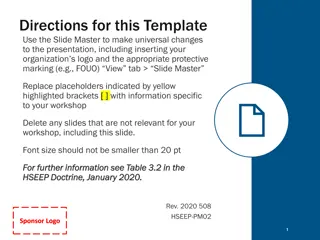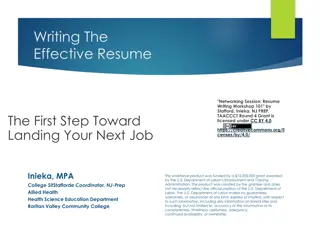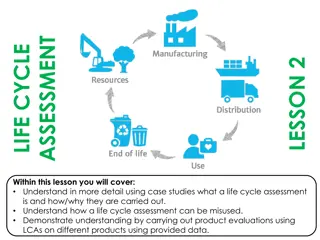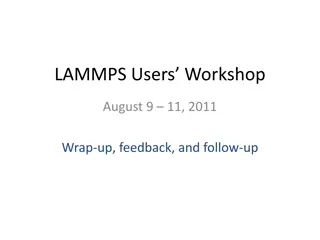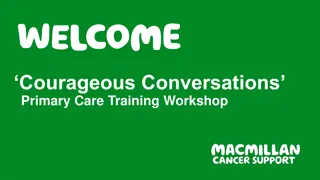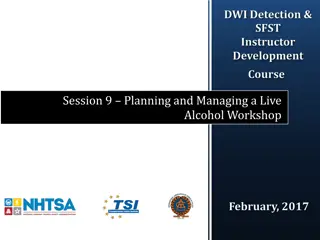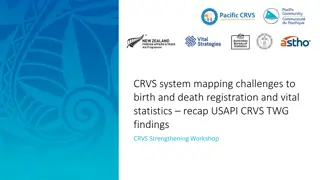
IAPT Mental Health Services in London
Learn about IAPT services, including the background, who they cater to, and common mental health issues. Discover who they do not see and how prevalent mental health problems are. Understand the symptoms of depression and anxiety and how to ask about mental health. Explore the role of IAPT in providing evidence-based therapies for anxiety and depression in primary care settings.
Download Presentation

Please find below an Image/Link to download the presentation.
The content on the website is provided AS IS for your information and personal use only. It may not be sold, licensed, or shared on other websites without obtaining consent from the author. If you encounter any issues during the download, it is possible that the publisher has removed the file from their server.
You are allowed to download the files provided on this website for personal or commercial use, subject to the condition that they are used lawfully. All files are the property of their respective owners.
The content on the website is provided AS IS for your information and personal use only. It may not be sold, licensed, or shared on other websites without obtaining consent from the author.
E N D
Presentation Transcript
IAPT Laura Dillon. Senior Psychological Wellbeing Practitioner. Community Living Well (K&C) Nayila Jibreel. Cognitive Behavioural Therapist. Westminster IAPT Tamara Parsons. Senior Psychological Wellbeing Practitioner. Back on Track (H&F)
What do you already know about IAPT? Have you made referrals to IAPT services? What would you like to know?
Background Primary mental health care service IAPT (Increasing Access to Psychological Therapies) was a 2007 Department of Health Initiative To expand provision of evidence based psychological therapies for people with anxiety and depression in primary care. Was based on a financial case with the idea that this would help more people return to work and reduce benefit payments (Lord Layard) Service in every borough in London/nationally
Who do we see? Mild to moderate mental health difficulties Low mood Anxiety generalised, social, health, panic, phobias, OCD PTSD Stress Sleeping difficulties Long term conditions where there is an interaction with depression/anxiety Perinatal mental health
Who do we not see Excessive drug and alcohol abuse (as primary diagnosis or where it may interfere with ability to engage in treatment) Severe mental health difficulty e.g. psychosis, bipolar disorder, personality disorders Under 16 / Under 18 H&F People with current or recent high risk to self/others better managed in secondary care
How common are mental health problems? Approximately 1 in 4 people in the UK will experience a mental health problem each year. In England, 1 in 6 people report experiencing a common mental health problem (such as anxiety and depression) in any given week. Source: MIND
How do we ask about mental health? What makes it difficult?
Common symptoms of depression and anxiety Anxiety Feeling nervous, anxious or frightened Racing mind Heart beating faster Shortness of breath Sweating Trembling Muscles tense up Dry mouth Feeling sick Butterflies in the stomach Feeling light-headed Tingling sensations in hands and feet Depression Feeling sad/numb/hopeless Losing interest & enjoyment in activities previously enjoyed Self-criticism & guilt Hopelessness Loss of energy or reduced activity Withdrawal from social activities Difficulty concentrating Changes in sleep patterns Changes in appetite and weight Loss of interest in sex Thoughts of death/self harm https://www.nhsinform.scot/illnesses-and-conditions/mental-health
Pathway of service A referral is received, this could be a self-referral or from a professional This is screened by a screening team to determine if suitable for primary care They are then offered a triage appointment to discuss their main difficulties and determine if we are the best service for them We may refer to a team within the service to receive support, or may refer or signpost to a more suitable service if this seems best for the client
How are we accessible? Clinics run from main bases and GP surgeries/children s centres/community spaces around the borough Interpreter appointments available (please send referral rather than self refer!) Online, telephone, face to face Evening appointments (Mon Thurs) Community outreach including underrepresented groups
Community Living Well- Kensington and Chelsea IAPT People with a GP in Kensington & Chelsea, Queens Park or Paddington. Phone: 020 3317 4200 Email: cnw-tr.clw@nhs.net Website: www.communitylivingwell.co.uk North Hub: St Charles Centre for Health & Wellbeing, Exmoor Street, London, W10 6DZ South Hub: 15 Gertrude Street, London, SW10 0JN
Community Living Well- Kensington and Chelsea IAPT Step 3- CBT Other teams within CLW Step 2 Guided self-help Counselling 1:1 face to face Step 4 psychology 1:1- telephone, f-f, skype Accredited counsellors and Acceptance and Commitment therapy PCLN with psychiatrist cCBT Counselling Psychologists (ACT) Navigators Courses and workshops 1:1 short term, goal focused EMDR Employment support Mood boost counselling Behavioural Couples Therapy (BCT) Peer support Stress less Couples therapy for depression Courses and workshops Outreach workshops Step forward Dynamic Interpersonal Therapy CBT group for depression Interpersonal therapy Boosting Self-esteem Mindfulness for Health (MABIL) Mindfulness-based Cognitive Therapy (MBCT) Long term conditions (LTC) group
Westminster Talking Therapies People with a GP in Westminster with the exception of Queens Park and Paddington GP surgeries. Phone: 030 3333 0000 Email: westminster.iapt@nhs.net Website: https://www.cnwl.nhs.uk/service/westminster-talking-therapies/ North Hub Address: The North Westminster Centre for Psychological Wellbeing, 11 Praed Street, London, W2 1NJ South Hub Address: Westminster Talking Therapies, 190 Vauxhall Bridge Road, London, SW1V 1DX
Westminster Talking Therapies Step 2 Guided self-help Step 3- CBT Other: 1:1- telephone or F-F 1:1 face to face Employment support specialist cCBT EMDR Signposting Courses and workshops Behavioural Couples Therapy (not Outreach workshops Mood boost couples counselling) Stress & Worry Courses and workshops How to Feel Good About Yourself Mindfulness for Health (MABIL) Mindfulness-based Cognitive Therapy for Depression (MBCT) Long term conditions (LTC) group Managing Motherhood
Back on Track- Hammersmith and Fulham IAPT People with a GP or residential address in Hammersmith and Fulham Phone: 0300 123 1156 Email: wlm-tr.backontrack@nhs.net Website: www.backontrack.nhs.uk Address: 194 Hammersmith Road, London, W6 7DJ
Back on Track- Hammersmith and Fulham IAPT Other Step 3- High Intensity Step 2 Guided self-help Counselling Employment support 1:1 face to face Provided by West London 1:1- telephone, f-f, (Twining Enterprise and EMDR Centre for Counselling cCBT Richmond Fellowship) cCBT Short term (12 weeks) 1:1 Courses and workshops Signposting Behavioural Couples Therapy (BCT -not counselling Stress control Outreach workshops couples counselling) Men s anger group (16 weeks) Enjoy Your Baby Dynamic Interpersonal Therapy (DIT) Bereavement Group (women with children Interpersonal Psychotherapy (IPT) Couples counselling up to 18mnths) Cognitive Analytic Therapy (CAT) Psycho-educational Groups: workshops Sleep, Building Self Esteem Assertiveness, Overcoming Social Anxiety Mindfulness, Stress Mindfulness Based Cognitive Therapy and Relaxation Adjusting to a Long term Health Condition





